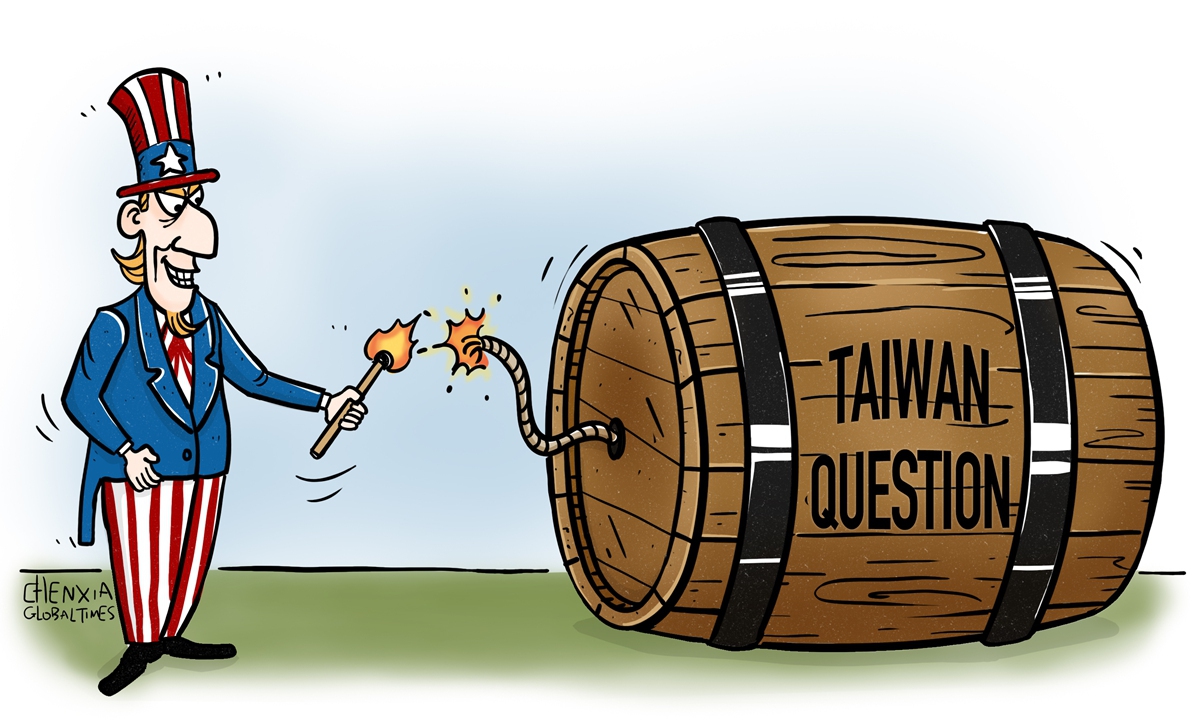US to consider 'comprehensively restructuring' policy toward Taiwan island; may lead to ‘China’s strong countermeasures’

Taiwan question Illustration: Chen Xia/GT
The US Senate Committee on Foreign Relations will consider a draft of the Taiwan Policy Act of 2022, which is described as the most comprehensive restructuring of US policy toward China's Taiwan region since the Taiwan Relations Act of 1979. Chinese experts warned that if the bill gets passed, it will lead to the complete elimination of the US' "one-China policy," and that China will take strong countermeasures.
The proposed Taiwan Policy Act intends to change the language of providing arms to Taiwan from being in a "defensive manner" to "arms conducive to deterring acts of aggression by the People's Liberation Army." It also intends to authorize the island of Taiwan with "$4.5 billion over four years in Foreign Military Financing, and prioritizes Taiwan's requests for assistance." Taiwan will be designated as a Major Non-NATO Ally for the US, according to the website of the US Foreign Relations Committee.
If this draft or most of its provisions are passed, it is further hollowing out the content of the US' "one-China policy," Xin Qiang, director of the Taiwan studies center with the Shanghai-based Fudan University and deputy head of the university's US studies center, told the Global Times on Tuesday.
"The US' de facto 'one-China, one-Taiwan' policy would take another big step forward, making the 'one-China policy' exist in name only," Xin said.
"It is far more serious than [house speaker] Nancy Pelosi's provocative visit to Taiwan island because the law's enforcement is above the policy and likely to continue to exert influence for decades to come," he said. The draft, if passed, would almost certainly follow a higher level of US security commitment to the island, he noted.
However, it is clear that this draft, which will be considered by the Congress, is not in large part a US government aspiration.
On September 7, US National Security Advisor Jake Sullivan said in a TV interview with Bloomberg that "there are other elements [of the draft] that give us some concern."
Sullivan is the only US government official to have made a public negative statement on the matter so far, though media reports imply that more people in the White House do not support the draft. According to a Bloomberg report in August, the Biden administration is concerned that the bill's strong language on Taiwan's status could upset the established US balance on Taiwan and is lobbying Democratic lawmakers to put the brakes on the bill.
Although the White House and the US Congress often disagree on Taiwan-related affairs, the White House and the US president - who under the Constitution can ultimately determine the policy - do not appear to have enough say and decision-making power, observers noted.
The White House is well aware of the dire consequences if the draft passes, yet its ability to influence the Congress is not as great as we might have thought, Xin said.
The scholar cited the example of Pelosi's provocative visit to Taiwan. Before Pelosi's visit to Taiwan, even President Joe Biden publicly expressed his disapproval, yet Pelosi's trip was not canceled, and the White House chose to acquiesce.
The US midterm elections are about to take place. Many lawmakers are taking this opportunity to hype foreign affairs issues, especially those related to Taiwan, in an effort to earn more votes, Xin notes.
And this draft entirely about Taiwan is not even what the Taiwan authorities want, Xin said. No senior officials in the Taiwan island have yet publicly stated their support for the draft.
If the draft is passed, it is likely that Taiwan will be the party other than the US that can no longer afford the Chinese mainland's stronger countermeasures, he said.
"This is more proof that Taiwan is just a pawn of the US."
On September 5, China vowed to take firm countermeasures against the US' latest approval of $1.1 billion in arms sales to the island of Taiwan, the largest since Biden took office. China has long urged the US to halt arms sales and military interactions with the island, including the mega-deal this time.
On September 8, the Chinese Foreign Ministry urged US politicians to immediately stop any form of official exchanges with China's Taiwan region, and stop sending wrong signals to Taiwan secessionists, in response to a trip made by a US bipartisan delegation led by Representative Stephanie Murphy, vice chair of the House Subcommittee on Intelligence and Special Operations.
China also needs to be wary of further US "salami slicing," such as this draft being blocked, but the provisions get scattered through other bills later to achieve the same effect, Xin said.



